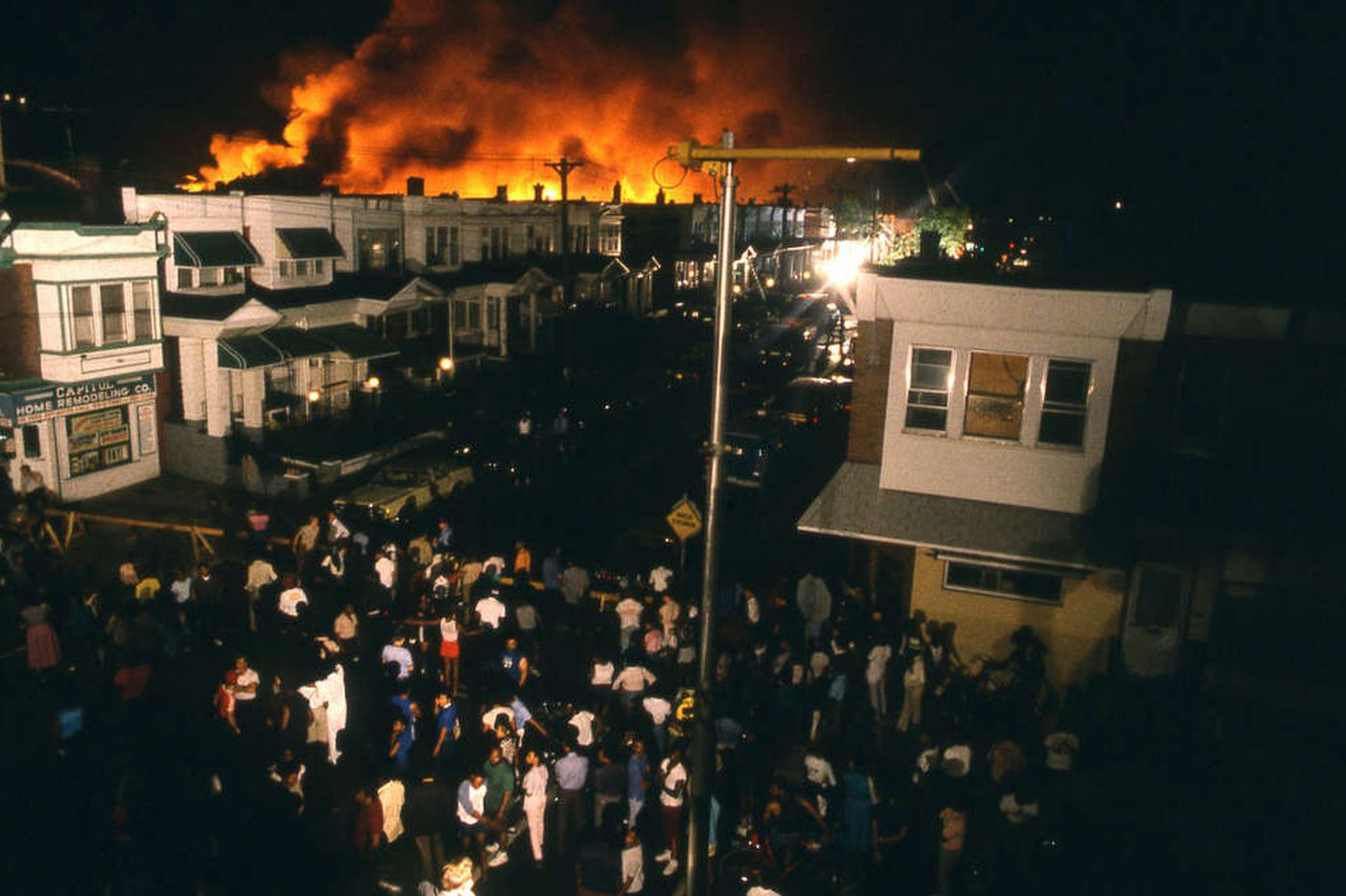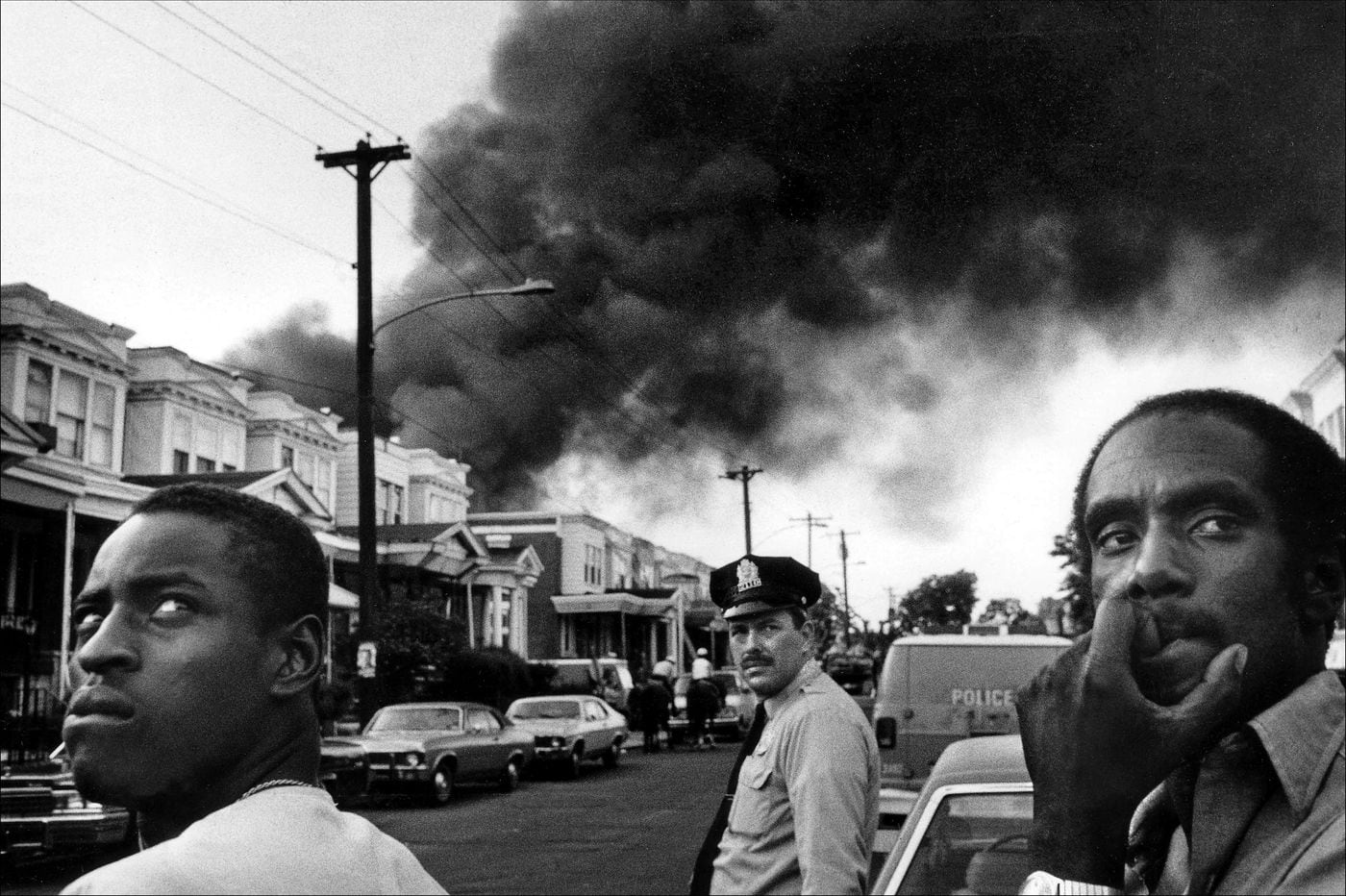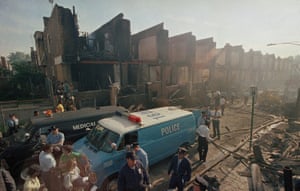35 years ago, Philly dropped a bomb on MOVE. It’s time to apologize. | Editorial
OPINION
Updated: May 12, 2020 -

The Inquirer Editorial Board | opinion@inquirer.com

FILE PHOTOGRAPH
Former Philadelphia Mayor W. Wilson Goode Sr. has called on the city of Philadelphia — in an op-ed published by the Guardian — to issue a formal apology Wednesday, the 35th anniversary of the day his administration dropped a bomb on a group of citizens. The action claimed the lives of six adults and five children and burned a neighborhood to the ground.
Both Mayor Jim Kenney and City Council President Darrell L. Clarke have so far remained mum on whether they will respond. They may think there are more important things to deal with at a time of a deadly public health crisis. They might think they didn’t participate in the bombing, so why should they apologize? They may wonder what good an apology would do, anyway.
These are fair questions. Still, it is an opportunity for city leaders to acknowledge some hard truths — about how race was at the center of a terrible loss of life and livelihood then, and 35 years later, it remains at the center of a terrible loss of life and livelihood.
On May 13, 1985, the police, after a day-long confrontation with the black radical and naturalist group MOVE, in an attempt to evict their compound on 6221 Osage Ave., dropped an explosive device on the roof of the building. The roof caught fire. Committed to achieving “tactical superiority” to his mission, then-Police Commissioner Gregore J. Sambor told the fire commissioner to let the fire burn. Eleven people, including five children, died, 61 houses burned, and at least 250 people were left homeless.
The vast majority of victims — MOVE and neighbors — were black.
The former mayor is adamant to this day that he was misled and didn’t know about the plan to drop an explosive device on the house, despite conflicting accounts that he approved it.
Heavily armed, and infamous for a confrontation with police in 1978 in which an officer was killed, and a nuisance on the block it occupied, MOVE was not a sympathetic group. But sympathy is not a prerequisite to recognizing injustice.
The bombing isn’t the only part of the MOVE story tainted with systemic racism. Neighbors of MOVE had complained about the commune for years but were ignored by the city. After the bombing, the city rebuilt houses that quickly fell apart, leaving many without decent shelter, and the neighborhood physically scarred.
Today, as poverty continues to choke the city, and Kensington residents ask how long homeless encampments would have been allowed in Rittenhouse Square, and as Benjamin Franklin High School parents whose concerns about asbestos were ignored until whiter, Science Leadership Academy students were exposed, it’s clear that questions of race and class continue to resonate. And long-standing racial health disparities mean that the coronavirus is killing nearly twice as many blacks than whites in Philadelphia.
Mayor Kenney and City Council President Clarke might have not been there on that day in 1985, but they are here today, as heirs to the city’s leadership history — and its future. Acknowledging mistakes is a powerful way to move forward and to demand change — even if those mistakes were made by someone else.
Philadelphia Mayor Jim Kenney, Council President Darrell Clarke silent on whether city should apologize for MOVE bombing
by Sean Collins Walsh, Updated: May 10, 2020

TOM GRALISH / STAFF PHOTOGRAPHER
As calls grow for the city to issue a formal apology for the MOVE bombing timed for Wednesday’s 35th anniversary of the tragedy — which left 11 people dead, including five children, and burned down 61 homes — the city’s top leaders have so far declined to weigh in.
“Nothing is planned,” said Mike Dunn, a spokesperson for Mayor Jim Kenney. Dunn did not respond to a question about whether Kenney would be supportive of efforts to acknowledge the city’s role in what is remembered as one of the darkest chapters in Philadelphia history.
Council President Darrell L. Clarke declined to comment through a spokesperson on whether he would support legislation related to MOVE, described at the time of the 1985 bombing as a radical back-to-nature group.
Former Mayor W. Wilson Goode Sr., who authorized the bombing on Osage Avenue in Cobbs Creek and has publicly apologized for his role, called for an official atonement by the city in an op/ed published Sunday by a British newspaper, the Guardian.
“After 35 years, it would be helpful for the healing of all involved, especially the victims of this terrible event, if there was a formal apology made by the City of Philadelphia,” Goode wrote. “That way, we can begin to build a bridge that spans from the tragic events of the past into our future.”
Goode’s comments are part of a nearly two-year effort by an ad hoc group of former city officials, MOVE members, and reconciliation experts, the Guardian reported. The group, which was formed after critics of Goode’s handling of the tragedy protested a 2018 ceremony naming a street after him, has also produced a draft apology resolution that City Councilmember Jamie Gauthier, who represents West Philadelphia, plans to introduce.
Kenney and Clarke were invited to participate in the process, but have not done so, said Pauline Thompson Guerin, a Penn State University psychologist working with the group.
“To not engage with an apology says a lot,” Thompson Guerin said in an interview. “It’s the city of brotherly love and sisterly affection, but you won’t apologize for an obvious harm, an event that nobody questions the devastation, nobody questions how horrible that was.”
Former Gov. Ed Rendell, who as district attorney prosecuted MOVE members, worked with the group for a time, but stopped participating, Thompson Guerin said. Rendell said Friday that he is skeptical that Council will approve a formal apology.
It is unclear when Gauthier’s resolution could be introduced. Council, which has been holding virtual meetings to practice social distancing during the coronavirus pandemic, is acting only on legislation related to the public-health emergency or the city budget.
Gauthier, however, said that, even without an official resolution, Council members could still recognize the anniversary at their meeting Thursday.
“It’s long overdue. This was a tragic and atrocious human-rights tragedy committed by our government against its own people,” Gauthier said in an interview Sunday.
But offering an official apology to MOVE remains a politically contentious proposal. Police Officer James Ramp was killed in a 1978 standoff that set the stage for the infamous bombing, although MOVE members say he was killed accidentally by another officer. The group was despised by some of its neighbors, who, among other complaints to the city, alleged that the children in the home were being neglected.
Thompson Guerin noted that the resolution offers an apology not just to MOVE members, but to everyone touched by the tragedy, such as police officers who have told the group they still struggle with post-traumatic stress disorder due to their involvement, and for a neighborhood that was turned upside down.
“This isn’t just about MOVE. A lot of people were harmed through a lot of incidents related to MOVE: the police officers, firefighters, responders,” she said. “We’ve talked to so many people who were impacted in a variety of ways.”
Ulysses Slaughter, a reconciliation strategist working with the group, said it was unfortunate that top city leaders couldn’t agree that an official apology was warranted.
“If the people who we say are our leaders … cannot see the value in that, it becomes more clear for me as to why people withdraw from political engagement because it doesn’t seem to have any real value,” Slaughter said.
Nonetheless, Slaughter said, he is optimistic the city will one day make amends.
“If the apology doesn’t come now," he said, "it’s the beginning of a long road ahead.”
When I was mayor, Philadelphia bombed civilians. It's time for the city to apologise
Thiry-five years ago, we did something inexcusable. A formal apology is crucial for the healing process, and overdue
W Wilson Goode
Sun 10 May 2020
THE GUARDIAN


‘We will never know exactly what happened on 13 May 1985 on Osage Avenue, but I do know there are some things beyond excusing.’ Photograph: George Widman/AP
The date 13 May will be forever etched in my mind.
Thirty-five years ago, members of Move, a black liberation and back-to-nature group, barricaded themselves in a row house in west Philadelphia. The situation escalated into an armed standoff with the Philadelphia police. On 13 May 1985, the police dropped an explosive device from a helicopter on to the house. The decision to drop explosives on a house filled with people was indefensible. The bombs ignited a fire which killed 11 people, including five children, and razed 61 homes to the ground.
The event will remain on my conscience for the rest of my life. I was the mayor of Philadelphia at the time. Although I was not personally involved in all the decisions that resulted in 11 deaths, I was chief executive of the city. I would not intentionally harm anyone, but it happened on my watch. I am ultimately responsible for those I appointed. I accept that responsibility and I apologize for their reckless actions that brought about this horrific outcome, even though I knew nothing about their specific plan of action.
This is the fourth time I’ve publicly apologized. My first official apology on behalf of the city came on 14 May 1985 in a televised address to the citizens of Philadelphia, to the Move family and to their neighbors. Today I would like to apologize again and extend that apology to all who experienced, and in many cases continue to experience, pain and distress from the government actions that day. They include the Move family, their neighbors, the police officers, firefighters and other public servants as well as all the citizens of Philadelphia.
There can never be an excuse for dropping an explosive from a helicopter on to a house with men, women and children inside
But there’s something more I want to suggest on this important anniversary. After 35 years it would be helpful for the healing of all involved, especially the victims of this terrible event, if there was a formal apology made by the City of Philadelphia. That way we can begin to build a bridge that spans from the tragic events of the past into our future. Many in the city still feel the pain of that day. I know I will always feel the pain.
There can never be an excuse for dropping an explosive from a helicopter on to a house with men, women and children inside and then letting the fire burn. I will never accept one. Some want me to blame the Move family or their neighbors; that is absolutely wrong thinking and I will never do so. We will never know exactly what happened on 13 May 1985 on Osage Avenue, but I do know there are some things beyond excusing.
I know I can’t change the past by apologizing, but I can express my deep and sincere regrets and call upon other former and current elected officials to do so. I believe this action can be a small step toward healing. I apologize and encourage others do the same. We will be a better city for it.
The Rev Dr W Wilson Goode, Sr served as mayor of Philadelphia from 1984-1992
The date 13 May will be forever etched in my mind.
Thirty-five years ago, members of Move, a black liberation and back-to-nature group, barricaded themselves in a row house in west Philadelphia. The situation escalated into an armed standoff with the Philadelphia police. On 13 May 1985, the police dropped an explosive device from a helicopter on to the house. The decision to drop explosives on a house filled with people was indefensible. The bombs ignited a fire which killed 11 people, including five children, and razed 61 homes to the ground.
The event will remain on my conscience for the rest of my life. I was the mayor of Philadelphia at the time. Although I was not personally involved in all the decisions that resulted in 11 deaths, I was chief executive of the city. I would not intentionally harm anyone, but it happened on my watch. I am ultimately responsible for those I appointed. I accept that responsibility and I apologize for their reckless actions that brought about this horrific outcome, even though I knew nothing about their specific plan of action.
This is the fourth time I’ve publicly apologized. My first official apology on behalf of the city came on 14 May 1985 in a televised address to the citizens of Philadelphia, to the Move family and to their neighbors. Today I would like to apologize again and extend that apology to all who experienced, and in many cases continue to experience, pain and distress from the government actions that day. They include the Move family, their neighbors, the police officers, firefighters and other public servants as well as all the citizens of Philadelphia.
There can never be an excuse for dropping an explosive from a helicopter on to a house with men, women and children inside
But there’s something more I want to suggest on this important anniversary. After 35 years it would be helpful for the healing of all involved, especially the victims of this terrible event, if there was a formal apology made by the City of Philadelphia. That way we can begin to build a bridge that spans from the tragic events of the past into our future. Many in the city still feel the pain of that day. I know I will always feel the pain.
There can never be an excuse for dropping an explosive from a helicopter on to a house with men, women and children inside and then letting the fire burn. I will never accept one. Some want me to blame the Move family or their neighbors; that is absolutely wrong thinking and I will never do so. We will never know exactly what happened on 13 May 1985 on Osage Avenue, but I do know there are some things beyond excusing.
I know I can’t change the past by apologizing, but I can express my deep and sincere regrets and call upon other former and current elected officials to do so. I believe this action can be a small step toward healing. I apologize and encourage others do the same. We will be a better city for it.
The Rev Dr W Wilson Goode, Sr served as mayor of Philadelphia from 1984-1992
SEE
https://plawiuk.blogspot.com/2020/05/the-day-philadelphia-bombed-its-own.html
https://plawiuk.blogspot.com/2020/05/may-13-1985-bombing-of-move-when-police.html
https://plawiuk.blogspot.com/2020/05/opinion-35-years-ago-philly-dropped.html
No comments:
Post a Comment